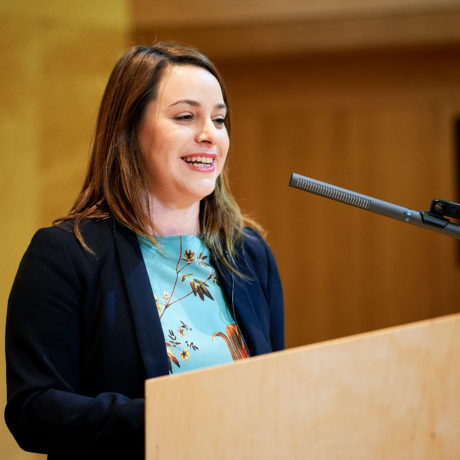Márta Pardavi
This article is a part of the campaign #12 Women on the Barricades, developed by The Norwegian Helsinki Committee in collaboration with illustrator Jenny Jordahl. We present 12 portraits of women standing on the barricades for other women, focusing on the greatest human rights challenges facing women in Europe today – and what needs to be done to overcome them. Read about the 11 other women on www.nhc.no/en/12womenonthebarricades
Chance led Márta to her first meeting with the refugee camp of Kistarca in 1995. There, she saw hundreds of foreigners illegally detained and held under inhumane conditions. The report written by her and the Hungarian Helsinki Committee, led the authorities to shut down the camp.
“I saw there how meaningful this work can be and how to apply international human rights principles in practice”, says Márta about this experience.
Legal aid to migrants criminalised
Her commitment to protecting human rights has been unwavering ever since. Márta and her organization are at the forefront of the struggle for Hungarians who are threatened by an increasingly authoritarian state. She is among the strongest critics of the Hungarian government’s undermining of democracy and fundamental human rights.
She is facing an increasing number of tasks. Working for victims of hate crime and people’s right to protest, are all in a day’s work for Márta. So are her efforts against violations of migrants and asylum seekers’ rights, racially motivated abuse and overcrowded prisons.
In 2018, providing assistance to migrants was criminalised, and organizations working with migrants and asylum seekers’ rights were subjected to a “25% immigration tax”.
“We have challenged these laws in court because they restrict our freedom of speech and association. In our opinion, these laws do not apply to what the Hungarian Helsinki Committee does. We provide free legal aid to ensure that asylum seekers get a fair legal process and access to the protection they are entitled to. Providing legal protection to people in need, is part of the fundamental human right to seek asylum and is not the same as assisting someone in leaving their country”, Márta explains.
Harassed on the street
Her work as a defender of refugees’ rights and a critic of the government, has come with a price, and she feels a more aggressive climate building up in the Hungarian society.
“Recently I was badly harassed on the street by someone who recognized me from the media. Civil society organizations regularly receive hate mail for speaking out against the dismantling of checks and balances and for protecting those groups who are stigmatised by the government. These attacks are not accidental. The government’s propaganda seeks to create and fuel this”, she says.
We have challenged these laws in court because they restrict our freedom of speech and association.
Márta Pardavi
Despite the difficulties, there is still hope. She and her staff share the enthusiasm and conviction that the work they do is important, and she sees the value of this work throughout the society.
“I have received far more really nice words from strangers on the street, telling me that they appreciate our work defending human rights”, says Márta.
“Remaining silent cannot be an option”
Márta has a clear message about what it takes to take Hungary in the right direction. She believes they must create a structural change in society that values inclusion and cooperation instead of exclusion, discussion instead of hatred, transparency and ownership instead of avoiding responsibility. Such changes are created equally by small everyday tasks, as by extensive human rights work.
“We must support those who are targeted for protecting their own or others’ fundamental rights and for protecting democracy. By supporting them, we also show that there is a supportive community. Remaining silent cannot be an option for those who care about living in a democratic society that protects us all”, says Márta.




